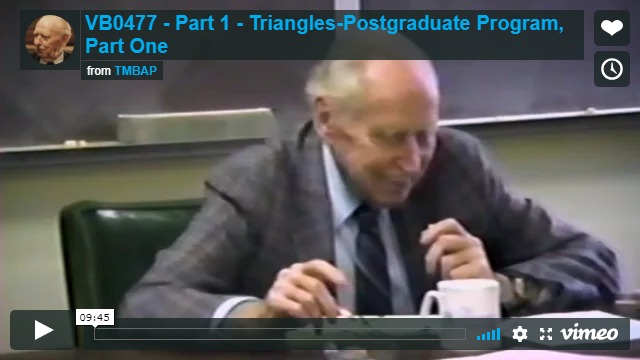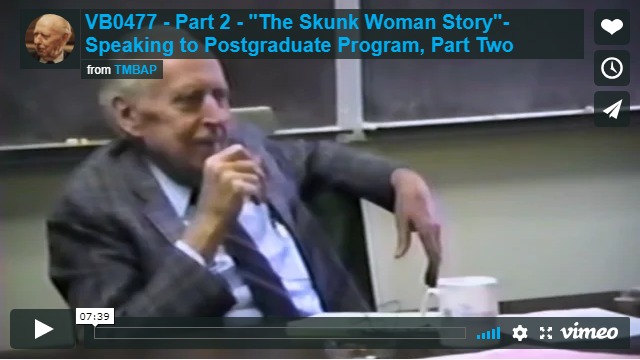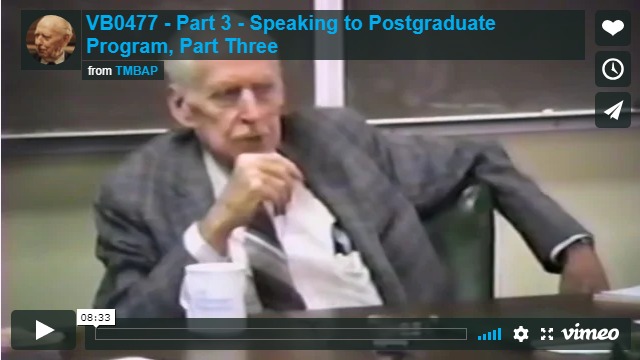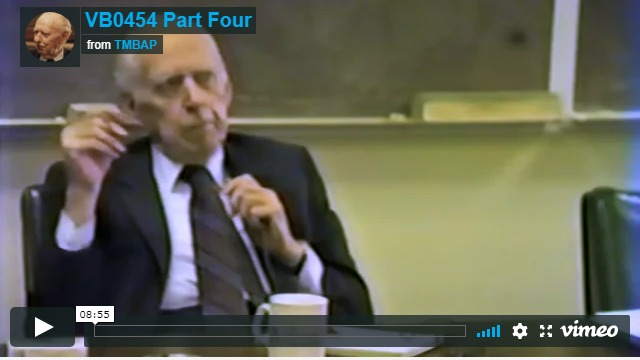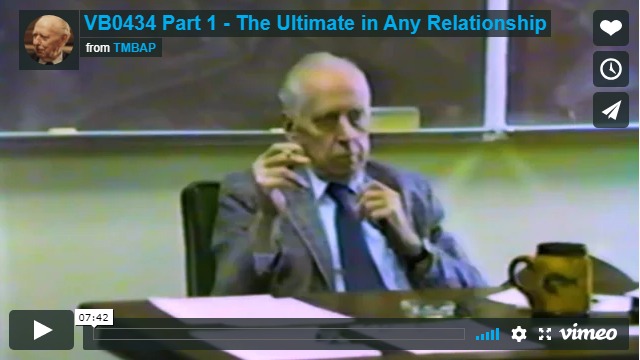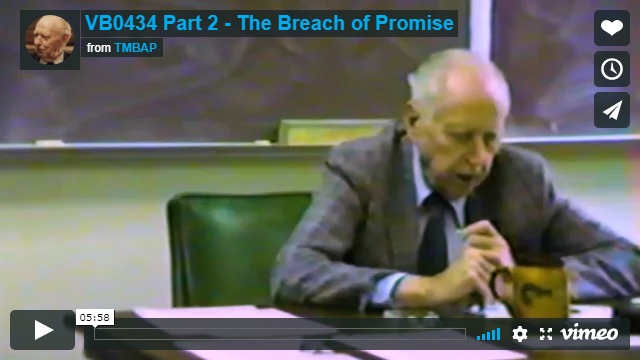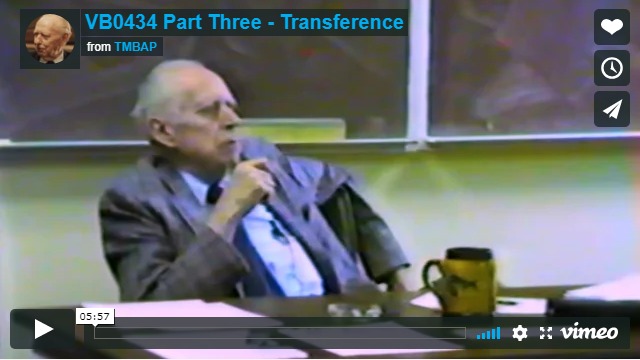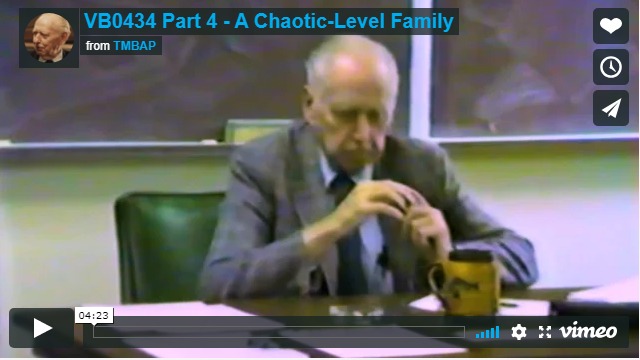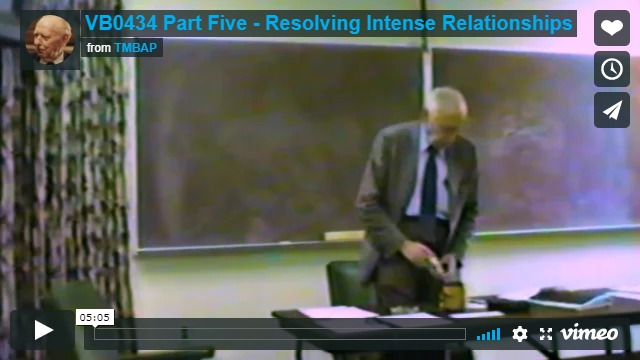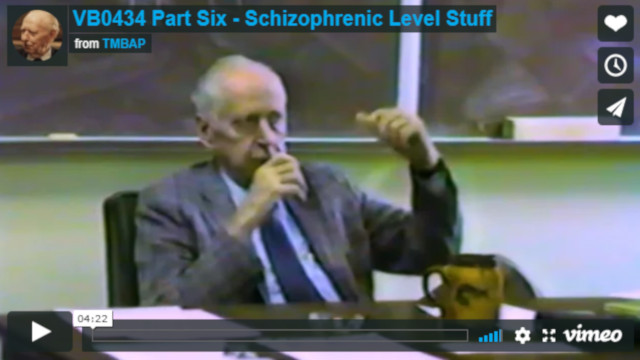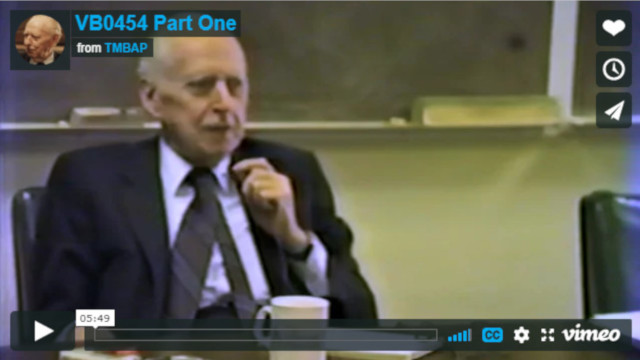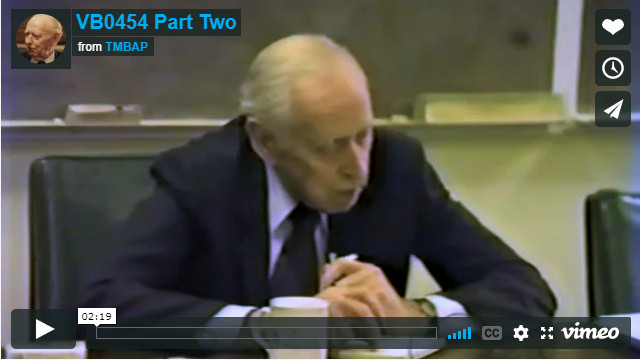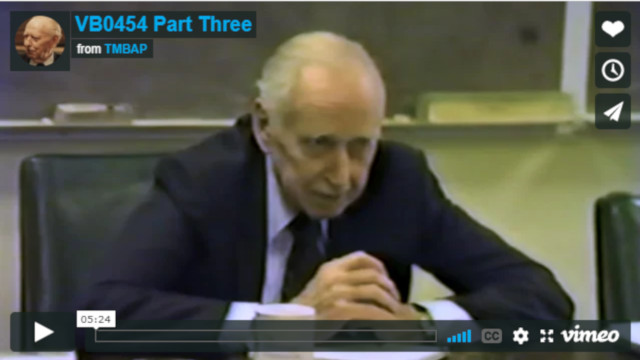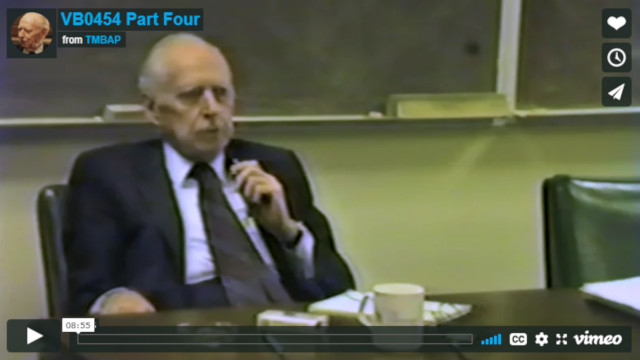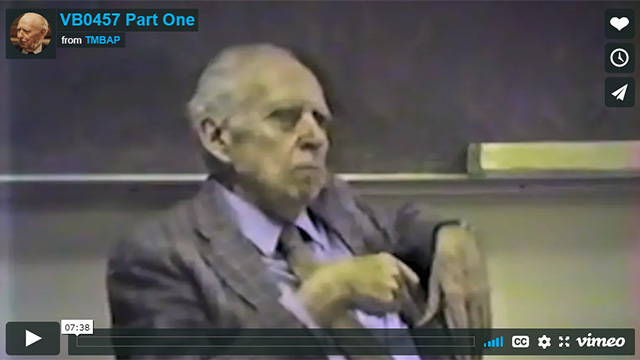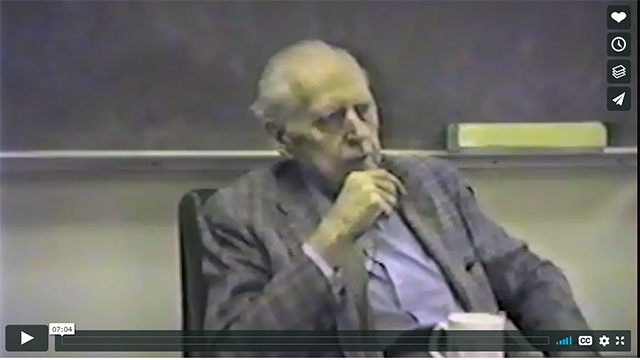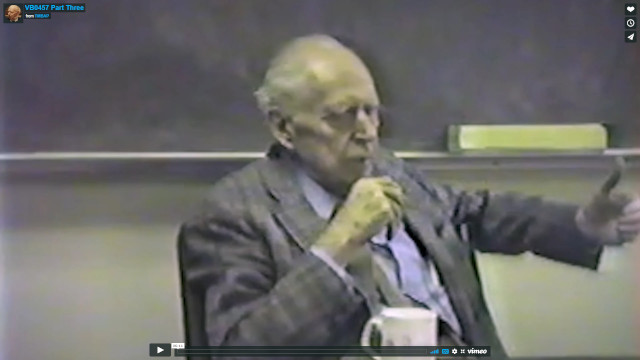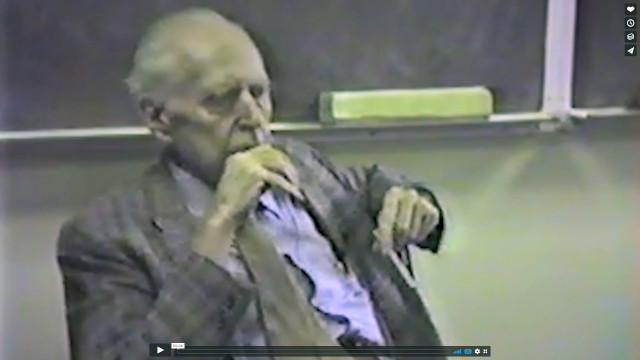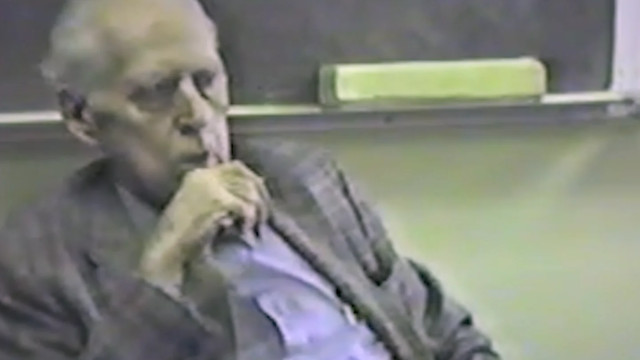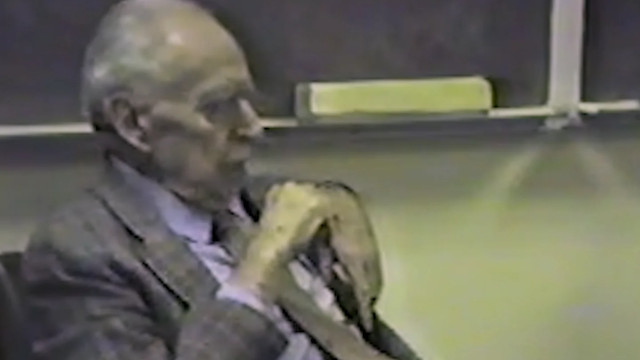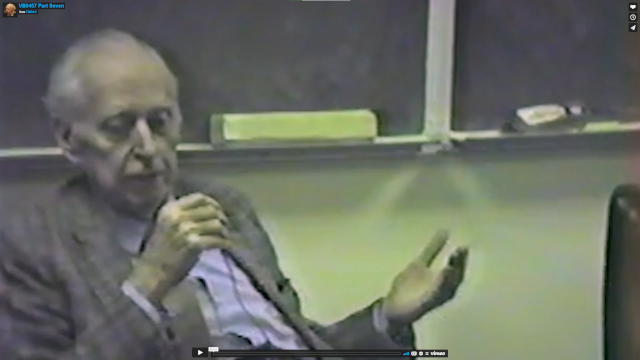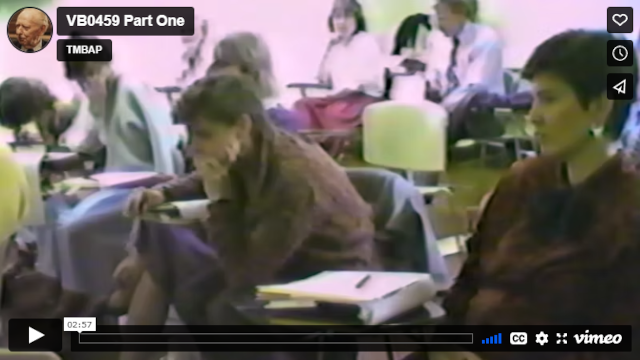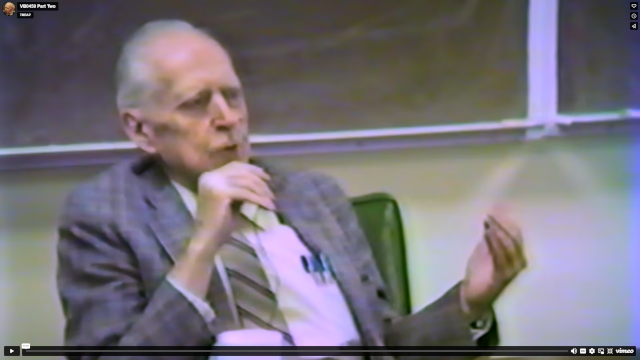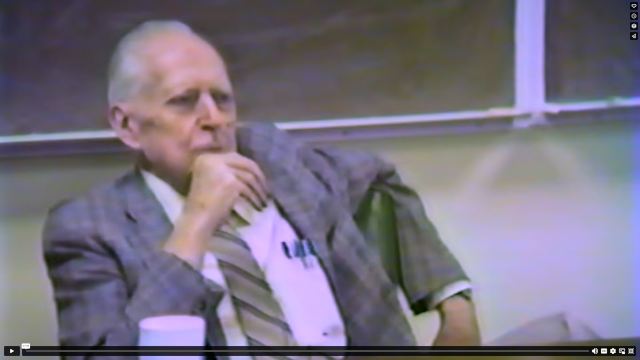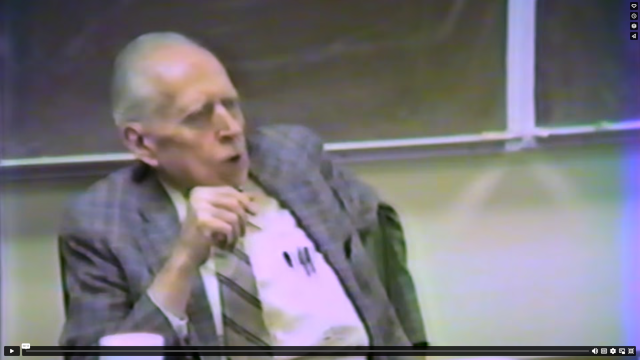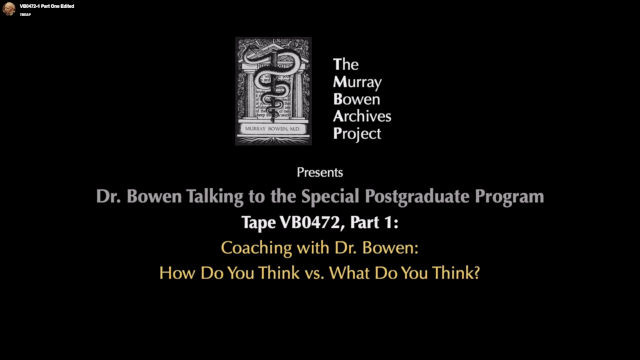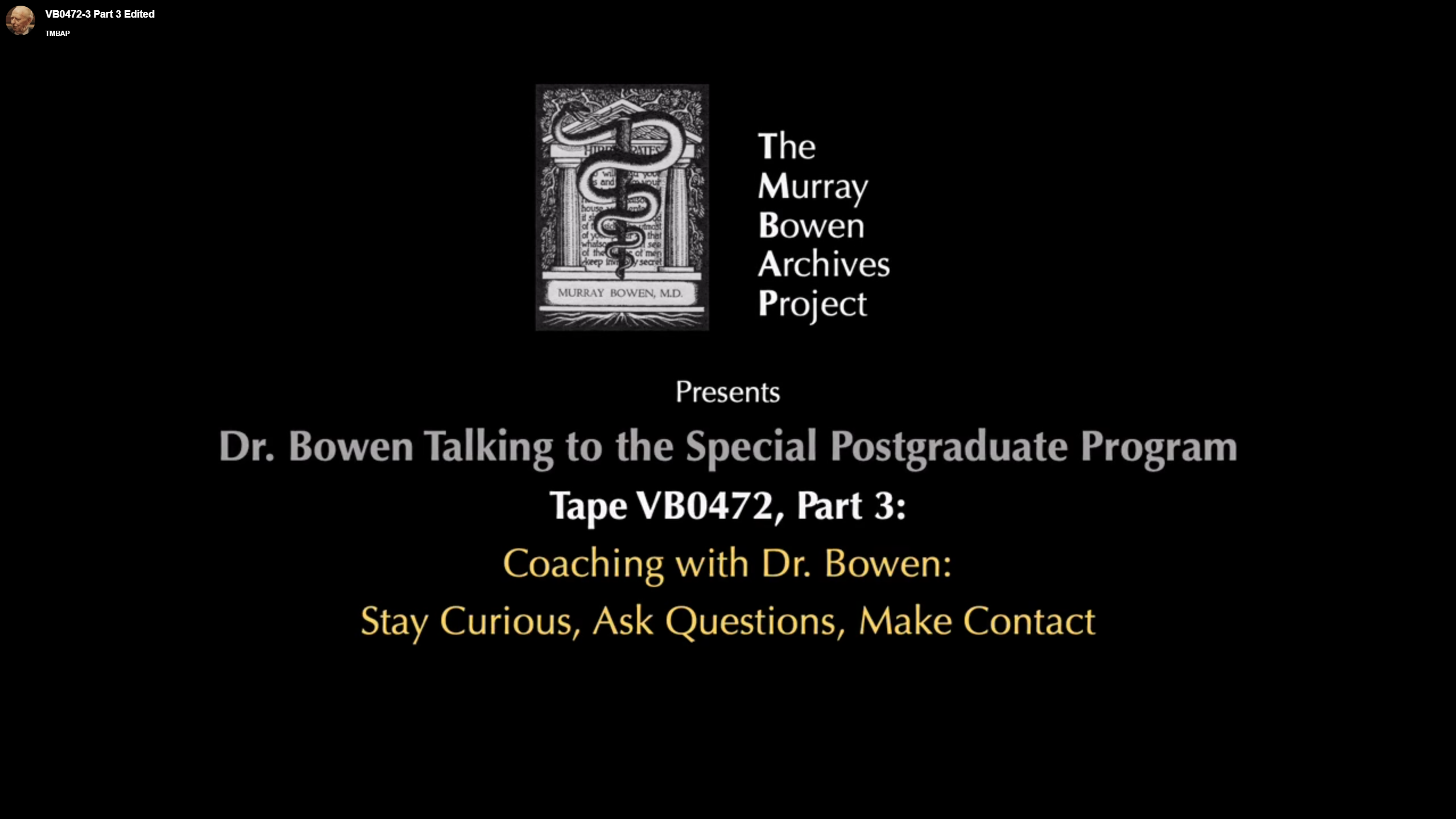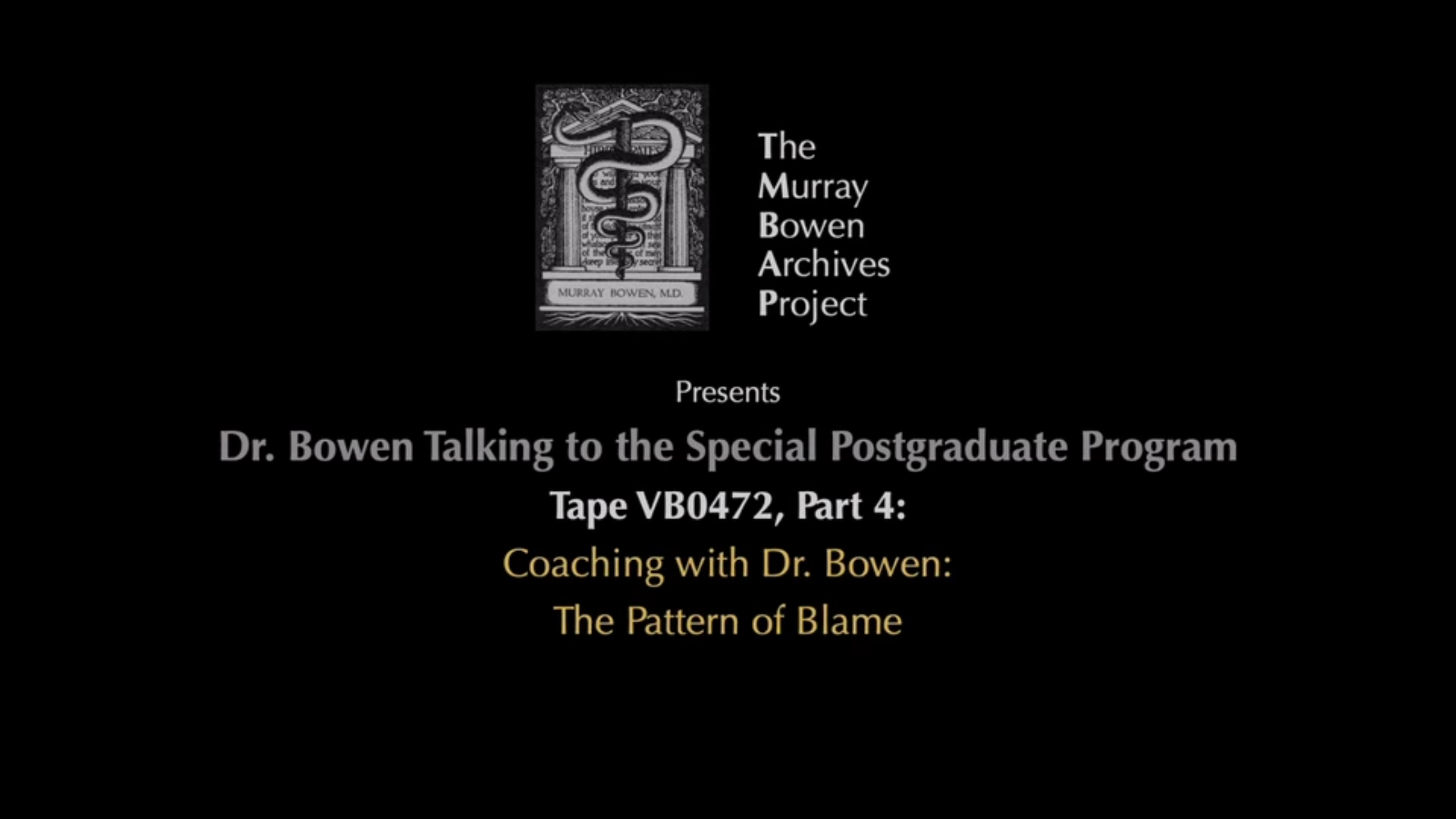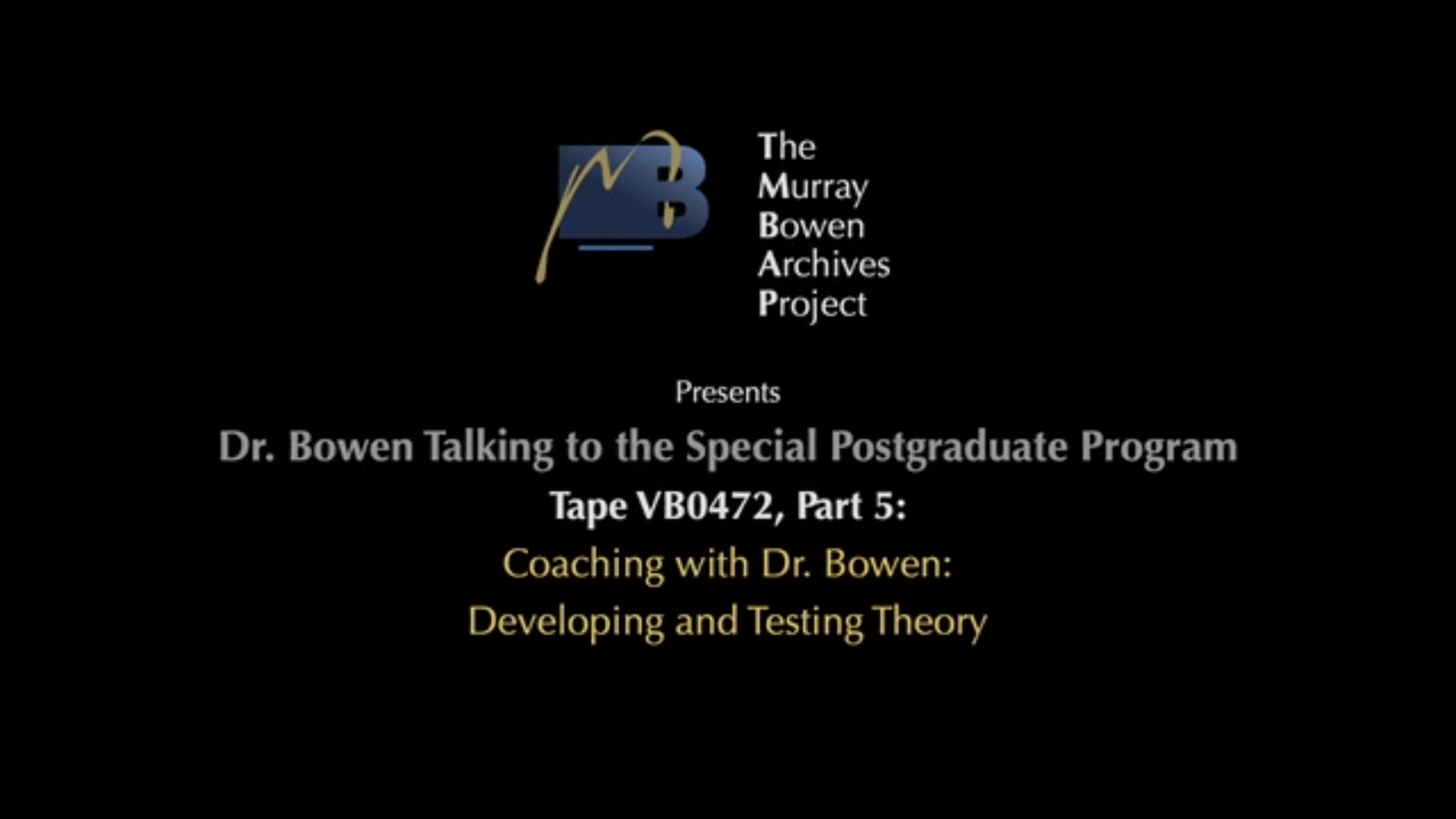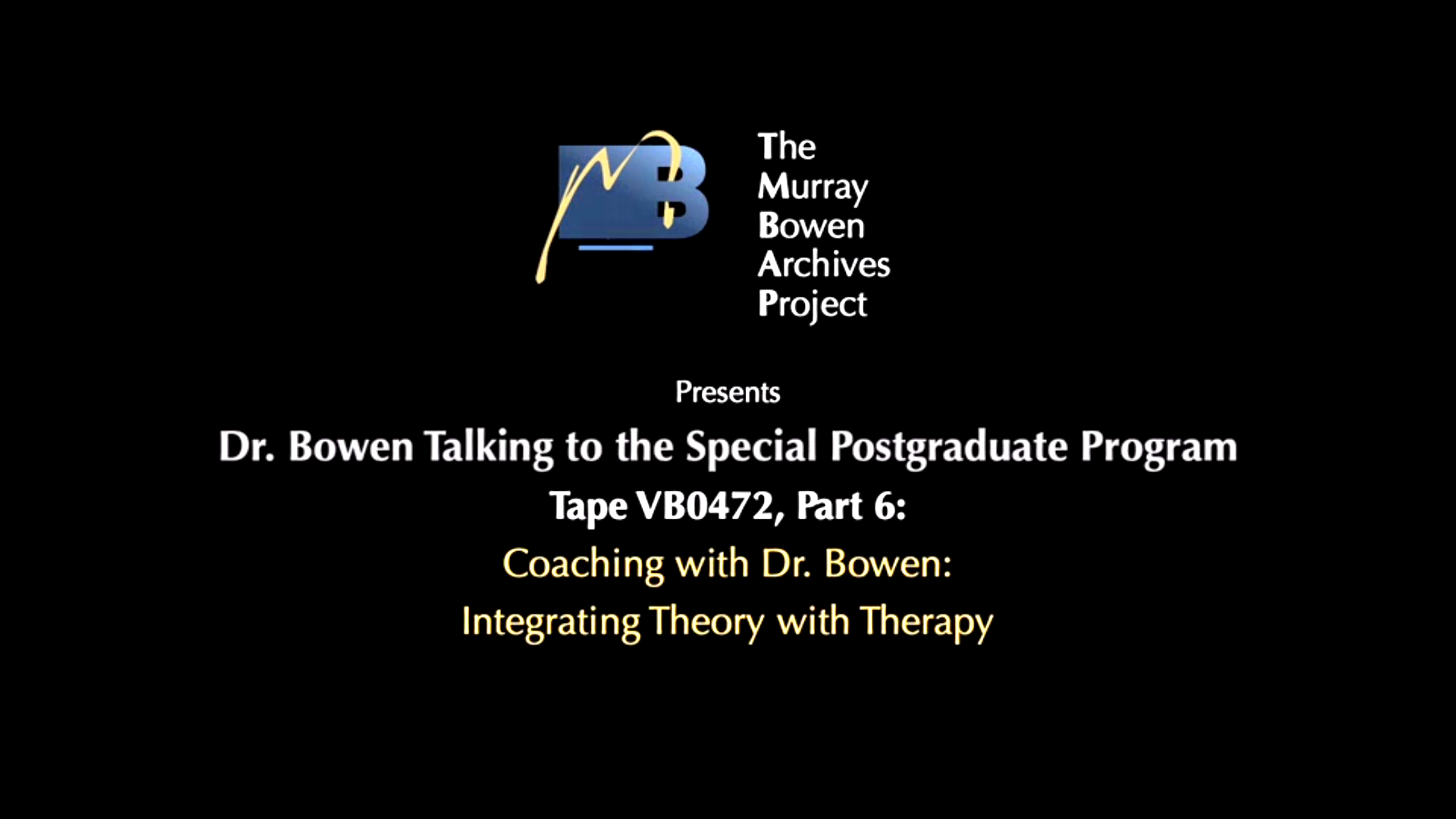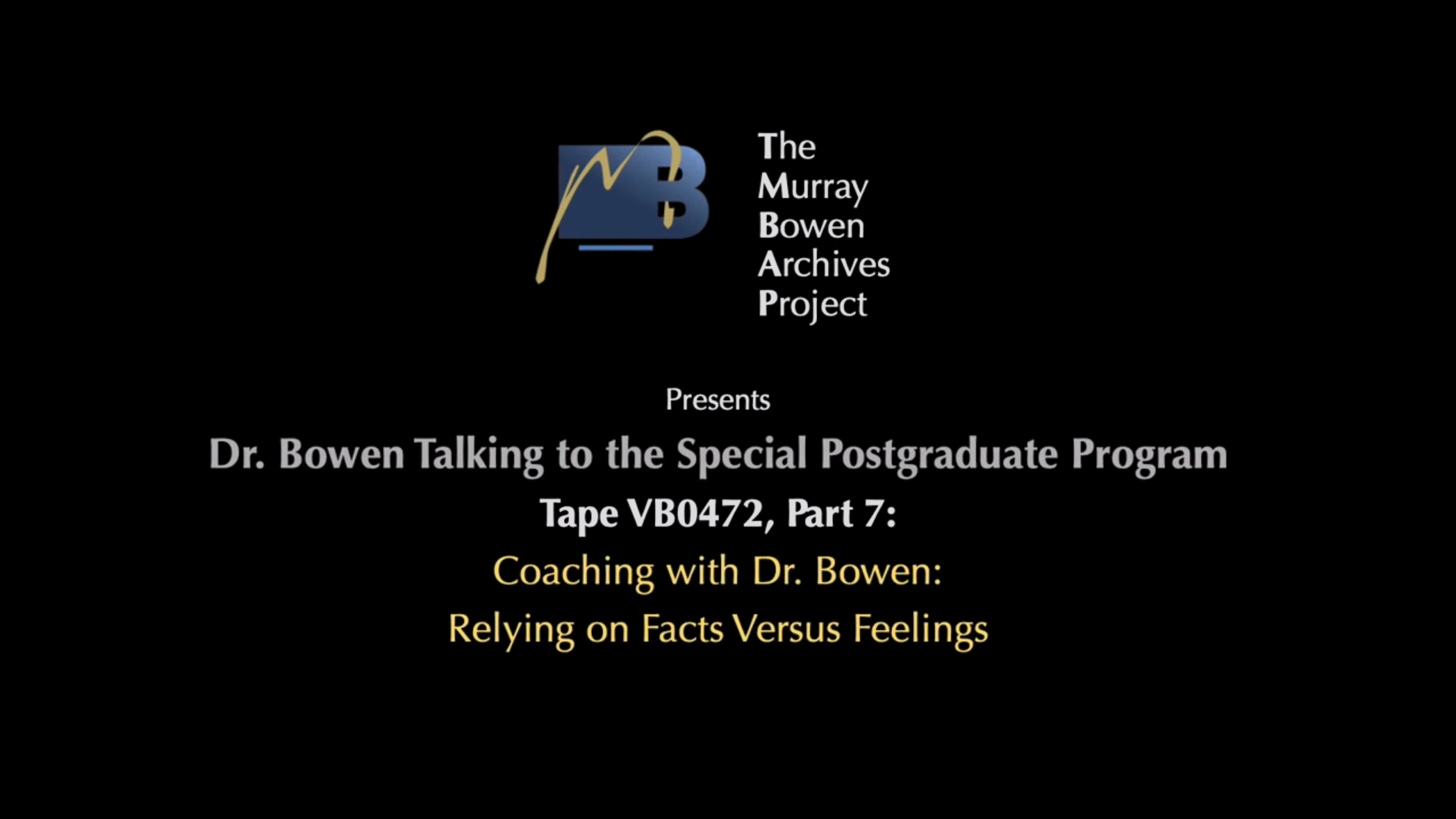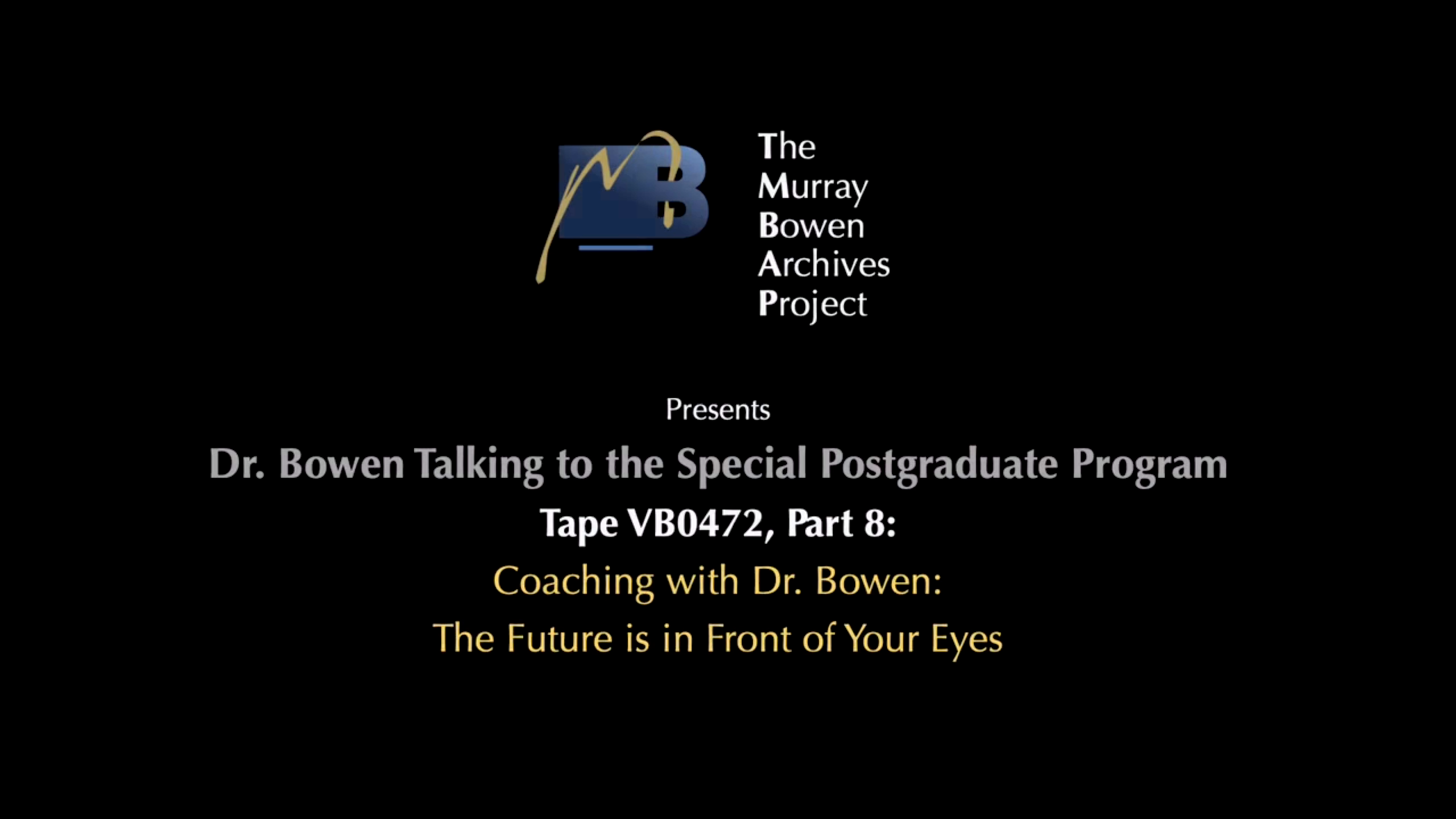This clip is part one of four clips featuring Dr. Bowen talking to the Special Postgraduate Program at the Bowen Center in the 1980s. Listen as Dr. Bowen discusses triangles and predictable ways to de-triangle a situation. He also offers some sage advice for those who have “screwed up” their marriage.
Videos, Dr. Bowen Talking to the Special Postgraduate Program
Dr. Bowen talking to the Special Postgraduate Program at the Bowen Center in the 1980s.
TrianglesThe Skunk Woman Story
This video clip features Dr. Bowen telling his infamous “Skunk woman” story about a patient declared to be “unanalyzable” by several psychoanalysts at the Menninger Clinic. Dr. Bowen challenges anyone with an interest in science to find out what makes a skunk stink. With Dr. Bowen’s supervision willing clinician achieved a perfect result with the skunk woman. Having the staying power to out skunk the skunk applies to your family and your spouse as Dr. Bowen explains.
Theory and Neutrality
This clip features Murray Bowen discussing the advantages of taking a more neutral position and how this impacts thinking. He also looks at his journey from Freud to a science of human behavior concluding systems was the only way to get there.
How to Approach the Family
This clip, entitled “How to Approach the Family,” looks at how individual versus family approach differs. Dr. Bowen describes symptoms as they move around the family as a “shell game” and challenges the audience to view the family without any polarity. His focus is to work with the leader in the family to achieve therapeutic excellence.
The Ultimate in Any Relationship
Dr. Bowen addresses the importance of relationships to mankind calling them basic to the human condition. There is always a relationship to somebody even in survival level families he asserts.
The Breach of Promise
Dr. Bowen discusses how schizophrenia is a model for all of us not separate from us. He details how to set up a relationship in therapy so the therapist promises only what they can do and does not become a liar.
Transference — The Monumental Moment
In this discussion with the Special Post-Graduate Program about transference, Murray Bowen states, “Everything in one relationship is in another. It is just a matter of intensity.”
A Chaotic-Level Family
In this video clip Dr. Bowen talks to the Special Postgraduate Program about how to work with families whose, “decks are awash.” He describes finding the most mature person in the group and working with that them to define what they can do, will do and won’t do.
Resolving Intense Relationships
Dr. Bowen talks about how his inability to resolve intense relationships with psychotic level people led him to think in terms of family. Instead of the person developing an intense relationship with Dr. Bowen and staying stuck he shifted his focus so that the intense relationship stayed within the family not with him. That is where it could then be resolved.
Schizophrenic Level Functioning
Dr. Bowen discusses how to move relationships back up between two other important people in the family. That is de-triangling in action. You can’t get rid of this level of intensity with one other person. De-triangling is how you get out of “smelly situations.”
Dealing with Polarities and Passions
In this video clip entitled “Dealing with Polarities and Passions,” Dr. Bowen addresses the importance of staying in the middle and seeing both sides.
Righteousness, War and Peace
Dr. Bowen opens this short two minute clip by saying, “There is no way to stop wars.” He goes on to discuss what he thinks the role of a low key human being could be in shaping wars by staying out of the righteousness of wars.
An Endpoint to Democracy
A question from the audience spurred Dr. Bowen to discuss global issues including democracy suggesting there is an endpoint to democracy and the U.S. is pushing toward that end point.
How to Approach the Family
Dr. Bowen talks about seeing the family as a unit without polarities and putting effort on the healthy side of the organism. He also addresses common errors including trying to sell the family on what you have discovered and the pitfalls of student evaluations.
Get Clear About What You Believe
Bowen challenges students to be clear about what terms are scientific. Echoing the challenges facing us today he asks, “How much are you influenced by the looseness in society?”
Freud; The Scientific Method
Listen as Dr. Bowen talks about Freud’s attempts to deal with feelings and where Freud fell short. Bowen also discusses the scientific method which he sees as a way to deal with feeling data.
Transference and Countertransference
Listen as Dr. Bowen teases apart the work of transference and countertransference in the clinical setting. “What do you put into the package of knowing who you are?”
Technique Consistent with Theory
In this 5 minute clip a student asks Dr. Bowen how you know your technique is consistent with theory. Dr. Bowen discusses the importance of being guided by the therapists view of man as an evolutionary being versus being guided by the head of the therapist telling him what to do. From September 1986.
Natural Upsets and Differentiation
Talking to the Special Postgraduate Program Dr. Bowen talks about making family visits during times of upset when the family system is less rigid.
“Go home and be less upset then they are and you achieve something”. From September 1986.
Societal Regression
In this clip the relevance of Dr. Bowen’s thinking shows as he talks about the totality of societal regression getting worse and worse. He refers to differentiation of self and how it gets into Societal Regression.
How Tension Can Filter Down an Institutional Hierarchy
In this video Dr. Bowen offers a real life example of how tension at the top of an organization can filter down and affect those at the lowest levels.
Calling It A Theory Does Not Make It A Theory
In Part 1 of this talk to the Special Post Graduate Program, Dr. Bowen challenges the group to get beyond their own heads and their own subjectivity in order to give direction to therapy with a client. “What are the hazards of doing therapy that feels right?”, he asks. “What do you do if your therapy is a bust?”
Inductive vs. Deductive Thinking
In Part 2 of this talk to the Special Post Graduate Program, Dr. Bowen points out that if you get too focused on differentiating a self, that in itself is a sinkhole. He goes on to outline the difference between inductive and deductive thinking, pointing out that we are all automatically deductive thinkers and have to work at inductive thinking. He challenges the group, “What in the hell are you going to do to get out of deduction?” His final question is for himself as a teacher. “How does someone in my position loosen up your way of thinking?”
Being All You Can Be Yourself, Instead of Being Better Than The Neighbors
In Part 3 of this talk to the Special Post Graduate Program, Dr. Bowen talks about differentiating a self in the face of the desires of others, citing an example from a tenure committee at Georgetown. He asks, “How do you go about being you when everyone around you is trying to dictate what you should be?”
Challenges in Working on Differentiation
In Part 4 of this talk to the Special Post Graduate Program, Dr. Bowen addresses the forces that work against you when trying to differentiate. He suggests that there is a force within all of us that would have us avoid this effort, and that hopefully, one can get to the point of working on it every day. Dr. Bowen notes, “We don’t change our spots too often.”
How Do You Think vs. What Do You Think?
In Part 1 of this talk to the Special Postgraduate Program, Dr. Bowen challenges the viewer with the question, “Are you interested in knowing what you are?” He explores “what it takes” to understand oneself. “How do you do it?” He directs one to examine how they are thinking, rather than what they think, if they wish to get closer to understanding themselves. When things don’t work out for you the way the theory would predict, is that a problem with the system or with what you did?
How Do You Get Out of a Built-In Family Morass?
What does having a good relationship with your mother make you but a leech? How does one truly pull oneself up while not leeching self from others? If you can manage to be in contact with a broader network of people, with more people in your extended family, you won’t leech self from them, and they won’t leech from you. If one wishes to not be a leech, they must not just stay in contact with their families but have real, honest communication with them as well.
Stay Curious, Ask Questions, Make Contact
How do you make contact with even the lowest functioning person, especially if they aren’t very verbal? Dr. Bowen points out that “they’re dying to tell you about it if you can ask the right questions.” Something accounts for people not being very verbal, and if you can break through that outside shell, then you can have a relationship with them. He notes, “If you can cause people to want to talk to you, you’re priceless to those other people because they probably are having problems contacting others.” That ability to communicate is the basis of a good relationship.
The Pattern of Blame
The pattern of blaming the functioning of self on others is pandemic. Blaming others can increase as a relationship grows closer. The level of differentiation can go down, and then each blames the other for self’s functioning. Dr. Bowen explains that this is the same problem in schizophrenia, when parents cannot get along with each other and put the problem on to the child. He frames schizophrenia as being primarily a psychological problem, noting that while there are genetic and physical-constitutional factors, that the psychological one is paramount. If the psychological process is removed, people can deal very well with the other factors.
Developing and Testing Theory
In this video, Dr. Bowen describes his methodology when first developing and testing his theory. At the beginning, he developed the device “theory comes first” as a guiding principle. The effort of working on theory first was to draw things out in detail so that one can anticipate and make sense of what comes up in practice. Once the theory had been developed, the effort around testing its validity required observing if any problems that came up were in the people using the theory or in the theory itself—with the latter requiring substantially more time to fix. The theory eventually became his impersonal rule book, but at the beginning, there were a lot of problems with the rule book. From June 7-8, 1988.
Coaching with Dr. Bowen: Integrating Theory with Therapy
Within a year of Dr. Bowen developing his theory, a larger field of family therapy was also emerging. He notes that his theory “was a rigorous procedure with as much scientific thinking as we were capable of,” and he did his best to make the therapy procedures the same. The goal in developing therapy based on theory was to have a system that was always governed by scientific thinking, so if anyone knew the theory, they automatically knew what to do as a therapist. From June 7-8, 1988.
Relying on Facts Versus Feelings
As long as your governing principle is an impersonal rule book, it does not change based on your feelings. The therapist needs to be dependent on their knowledge rather than their feelings. By overly relying on feelings rather than facts, Dr. Bowen warns, “When the world gets aggressive and nasty, you get nasty back. You counter a feeling with a counter-feeling.” From June 7-8, 1988.
The Future is in Front of Your Eyes
Dr. Bowen notes that science has barely begun to discover everything there is to know, but that the process of discovery starts right in front of one’s own eyes, by observing the world around you. The elements of Bowen theory are observable in the world, but he notes that people often can’t see the future that is right in front of their eyes. However, if one can aim to “erase” their own head, to have a flexible mindset, it allows one to adopt new theories and to advance science. Feelings make it difficult to “erase” one’s own head, but with that goal in mind, it makes it possible to hear new ideas. From June 7-8, 1988.

